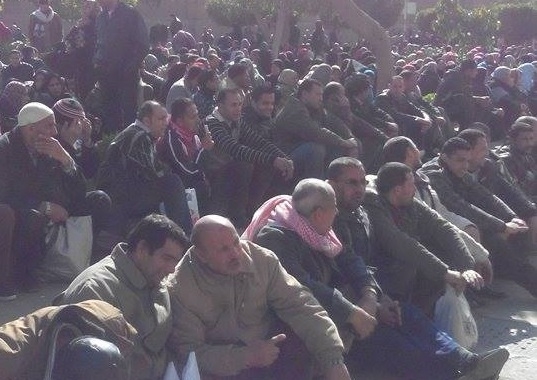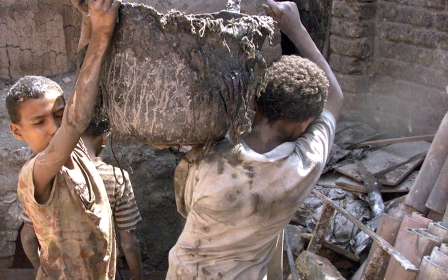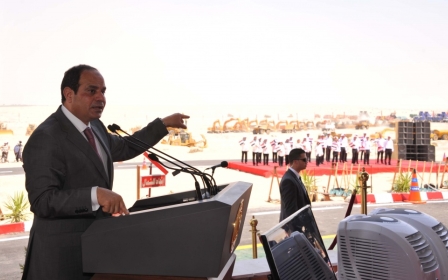Egypt's Mahalla textile factory workers end four-day strike after deal reached

Workers at a textile factory in the Egyptian town of Mahalla ended a four-day strike on Saturday after working out an agreement with management to be paid a previously promised profit share and discuss other issues.
Mohamed Assad, a leader of the 10,000-strong strike at the Holding Company for Cotton Spinning and Weaving, told Daily News Egypt that the strike and sit-in were called off after negotiations between workers' representatives and the employers on Saturday.
He emphasised that financial demands were not the primary focus and that their main concern was their call for a restructuring of the company’s leadership and the restoration of government subsidies, which been promised by Prime Minister Ibrahim Mehleb.
At a meeting in December between the Minister of Industry Mounir Fakhry Abdel Nour, cotton and textile industry leaders and chairman of the General Union of Textile Workers, the Prime Minister promised to make the textile industry a “national project” and continue subsidies in the face of heavy losses in the sector.
However, last week, Minister of Agriculture and Land Reclamation Adel El-Beltagy announced that the state would not be offering any form of subsidies for cotton farmers or spinners during the next season.
Striking workers saw this as betrayal.
“The lack of raw materials is one of the problems facing the company,” Assad added. “Although Prime Minister Ibrahim Mehleb promised the workers in previous meetings that the government will provide enough supply cotton, the promises were not met.”
The Centre for Trade Unions and Workers Services announced the strike on Tuesday, which involved around 10,000 male and female workers, and saw many involved in an open-ended sit-in at the company's headquarters.
A union statement said the strike was called “to claim the rest of the (annual bonus) for two months of the financial year 2013/2014, to start swiftly the company's development plans as the government promised, and to investigate corruption claims and prosecute corrupt (officials)."
"Conspiracy"
Some involved with the strike, however, were critical of the decision to call it off and expressed concern about the actions of the union's leadership.
Kamal El-Fayoumi, one of the strike leaders, stated that there was "a conspiracy between the chair of the factory's board and the union" that eventually lead to the decision to go back to work.
"The strike started last Tuesday as the government didn’t implement any promises after the original visit of Prime Minister Mehlab to the factory," he told MEE.
"Mehlab came to the factory last year when there was a strike that lasted for 13 days and he promised to achieve workers' demands within three months, like providing cotton to help the factory work with full capacity, end corruption inside the factory and make sure bonuses were distributed by 31 December each year.
"Nothing happened from these promises," he said, adding that losses at the company were 432 million Egyptian pounds last year and 700 million Egyptian pounds this year.
RNN, a pro-Muslim Brotherhood news website, reported on Saturday that workers at Mahalla were threatened with dismissal, by police and factory security guards, if they did not end the strike.
Fayoumi corroborated the claim, saying the workers were now in "rage mode" as a result of suggestions they could now be arrested for having taken part, as well as at suggestions that the days lost to the strike would taken off the workers' annual holiday, something which had not happened in previous strikes.
"Over the last 18 months Sisi's government hindered the workers because some of them are ex-NPD policy committee [the party of former president Hosni Mubarak] and Muslim Brotherhood," he said.
"Those people don’t work according to the revolutions of Jan 25 and June 30, as they don’t want stability, so they create unemployment which can be bombs in front of the regime."
Wael Habib, a worker in the factory, also blamed a lack of support from the government.
"Workers are locked in a never-ending cycle of protests, negotiations and lost promises," he told MEE. "After each strike and promise, they broke their promise. The administration claims that workers don’t want to work. Yes, they are right, but this is a result of there being no cotton for work. When the PM came to the factory he said that he will provide our factory with cotton for 3 months. Our factory Consumes cotton with the cost of 1 Million EGP."
"The cotton the PM provided lasted only for one month and they said they can't provide us with more".
He also slammed the main Egyptian Trade Union Federation (ETUF) as corrupt and as having too cosy a relationship with the government.
"Sisi doesn’t know anything about labourers," he said. "He only meets Gebaly Maraghi, head of the federation. Can ETUF gather the 6 million workers in square? No they can't."
"They are not in touch with workers and doesn’t know about them".
The Marxist Revolutionary Socialists (RevSoc) on Saturday claimed workers had received threatening text messages on their mobile phones during their sit-in at the company. Habib cited one security officer blaming "foreign agendas" among the striking workers.
"The workers are not represented in the Egyptian society. They don’t get their rights," added Habib.
The Centre for Trade Unions and Workers Services announced the strike in a statement on Tuesday.
"More than 10000 male and female workers in the Mahalla textile company began a strike this morning and an open-ended sit-in at the company's headquarters,” read the statement, “in order to claim the rest of the (annual profits) for two months of the financial year 2103/2014, to start swiftly the company's development plans as the government promised, to investigate corruption claims and prosecute corrupt (officials)."
- See more at: http://www.middleeasteye.net/news/strike-mahalla-textile-factory-enters-third-day-egypt-1492985094#sthash.DpnQJKgc.dpufA history of militancy
The Mahalla textile complex has frequently been a focal point of trade union activity and worker militancy.
Strikes by workers in the complex, starting with a walkout in 2006, have been highlighted by many as the spark of the movement that eventually led to the 2011 revolution that overthrew aging autocrat Mubarak.
The Mahalla workers were also the prime movers behind the 2008 Egyptian general strike, also referred to as the “Egyptian Intifada”, which also gave birth to the 6 April Youth Movement.
“6 April 2008 wasn’t an uprising, it was the real revolution,” asserted Karim El-Beheiry, a labour activist and former Mahalla employee.
“People refer to the events of 2008 as a rehearsal, and say 25 January 2011 was the first wave of the revolution,” he told Al-Monitor “This isn’t true, 6 April was a genuine revolution against the regime and it wasn’t hijacked by the Muslim Brotherhood, as was 25 January - 25 January was the second wave of the revolution.”
"Mahalla is important for two main reasons,” said Anne Alexander, co-author of Bread, Freedom, Social Justice: Workers & the Egyptian Revolution.
“Firstly because of the sheer size of Ghazl al-Mahalla (Misr Spinning) as a workplace. If a large part of the 20,000 or so workers join a strike this can create a very powerful impression on journalists, politicians and other activists.
“A turning point in the growth of opposition to Mubarak was the success of the strike in Mahalla in December 2006. This strike encouraged workers across the textile sector to raise similar demands, helping to open a ‘second front’ in the struggle against the regime at a time when democratic activists were reeling from repression,” she told Middle East Eye.
“Success for the Mahalla workers is important for similar reasons, even though the context is different. Even though strikes like these are ostensibly just about bread and butter economic demands they do challenge the regime's attempts to criminalise all forms of protest and every expression of democratic rights."
Some observers argued that significant strikes in Mahalla, Cairo’s Public Transportation Authority and other key sectors contributed to the downfall of former Prime Minister Hazem El-Beblawy’s cabinet - hurriedly announced at a 24 February press conference last year.
"It is time we all sacrificed for the good of the country," Beblawy said during his resignation speech. ”Rather than asking what has Egypt given us, we should instead be asking what we have done for Egypt."
His successor, current Prime Minister Ibrahim Mehleb, then also tried to quell workers’ unrest with cautious appeals for calm.
"We’re betting on the patriotism of the Egyptian workers,” Mehleb said, shortly after taking office.
However, since then, occasional workers’ protests have been met with repression by the security forces.
In September, several workers at the Alexandria Textiles Company were shot with cartouche (birdshot) rounds by police, Mada Masr reported.
Mahmoud El-Sobky contributed to reporting
Middle East Eye propose une couverture et une analyse indépendantes et incomparables du Moyen-Orient, de l’Afrique du Nord et d’autres régions du monde. Pour en savoir plus sur la reprise de ce contenu et les frais qui s’appliquent, veuillez remplir ce formulaire [en anglais]. Pour en savoir plus sur MEE, cliquez ici [en anglais].




